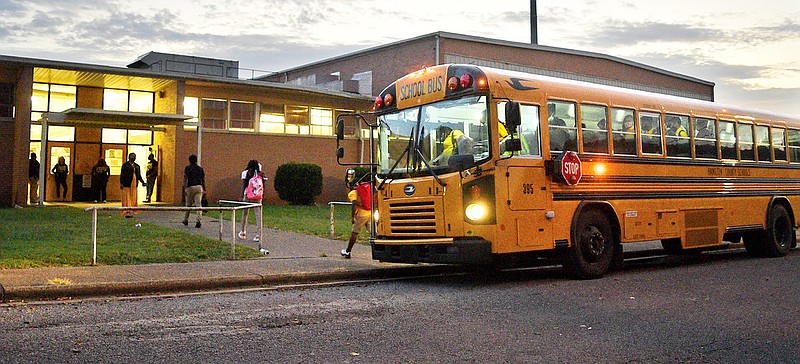"The school is going off the list, and the state is going to say, 'Yay, we did it.'"
- Hamilton County Board of Education member Karitsa Mosley Jones
The subject was Orchard Knob Middle School, the reference is the state's list of low-performing priority schools and the occasion was Monday night's special called meeting of the school board.
Jones was protesting the school's inclusion in a pilot program mandated by the state legislature and the fact the board had to approve it.
The state selected Orchard Knob for the program, and the board's approval actually was a formality since the pilot program is mandated by state law. Last month, board members voted not to approve the pilot. Not long after that vote, the board was told it would need to meet again to approve the program or face consequences, and Monday's meeting was to do that (the board voted 5-2 to accept the pilot; board Chairman Tucker McClendon was the other "no vote").
Jones, who does not represent the school on the board, said her vote was "a community stance."
School officials, she said, "have worked a lot of years, and they are so close to coming off the list. Now the students will become part of another experiment at the cost of their academic achievement."
In other words, Jones is saying the pilot program will damage, not improve, the academic achievements Orchard Knob has made.
Let's take a look at the school's record.
According to Orchard Knob's state report card, in the 2020-2021 school year, 5.5% of its 413 students achieved overall mastery of subject matter on state tests, down from 6.9% in 2019 and only a tick up from its 5.4% mark in 2018. In 2020, due to COVID-19, no tests were taken.
In 2021, a priority school could come off of the list if its test scores ranked in the state's 15th percentile for the recent academic year or the state's 10th percentile for two straight testing years. The school was not close to either of those percentiles.
A school also could exit the list by earning one of two top designations - either a four or a five on a scale of one to five - for academic growth in math and reading for two straight years.
In 2021, Orchard Knob received a two in its academic growth in reading and a three in math. (According to the state, scoring a one indicates less than expected growth, while five means more than expected growth.) So, based on the most recent criteria, its students would still need to accelerate their program in both areas and maintain it for two years.
If the school is close to coming off the state's priority list, Jones must know of a new measurement being considered.
But let's look more deeply at the school's scores.
In English/language arts (reading), only 5.8% of Orchard Knob students showed a mastery of the subject matter in 2021. That was down from both 7.2% in 2019 and 6.9% in 2018. In math, only 5.4% of students showed a mastery of the subject in 2021. That had fallen from 6.3% in 2019.
In a related area, the students' progress on English language proficiency (growing their ability to read, write and speak English across different school years) dropped from 30.8% in 2018 to 25% in 2019 to 12% in 2021. That's clearly going the wrong way.
Scores were higher social studies and science.
Orchard Knob students mastering social studies improved from 6.7% in 2018 to 10.2% in 2019 to 11.7% in 2021. Students mastering science were at 9.2% in 2021.
The school, which had an 11-1 pupil-teacher ratio according to the state report card, enrolled 85% Black students, 11.9% Hispanic students and less than 5% white students. Of those students, 83.1% were termed economically disadvantaged, 9.4% homeless, 9.2% English language learners and less than 5% foster children.
In 2021, its Hispanic students outperformed its Black students almost two to one in all four major academic categories.
In English/language arts, 11.9% of Hispanic students mastered the subject compared to 5% of Blacks. In math, 9.5% of Hispanics achieved mastery compared to less than 5% of Blacks. In social studies, 25% of Hispanic students mastered the subject compared to 9% of Blacks. And in science, 19% of Hispanic students achieved mastery compared to 7.4% of Blacks.
The school's Hispanic students also bettered white students in English/language arts and math but trailed them in social students and narrowly in science.
Orchard Knob, according to state figures released late last year, was third in the district's 79 schools in per-pupil expenditures at $13,775.49 per student, so the problems should not be an issue of money.
As we detailed in a letter Commissioner of Education Penny Schwinn sent to state Sen. Todd Gardenhire last month, the success of the pilot program being implemented "is determined in the law as growth from the point of entry - in other words, it is only how well the school performs from this point forward (after any growth currently made)."
She went on to say that should Orchard Knob exit its priority school status, that is not the state's ultimate bar of success.
"It is showing progress towards success," Schwinn said. "Again, we don't want credit."
We think the attitude of Jones and the Orchard Knob community ought to be: Bring on that pilot program. Have you got a couple more? We need help here.
